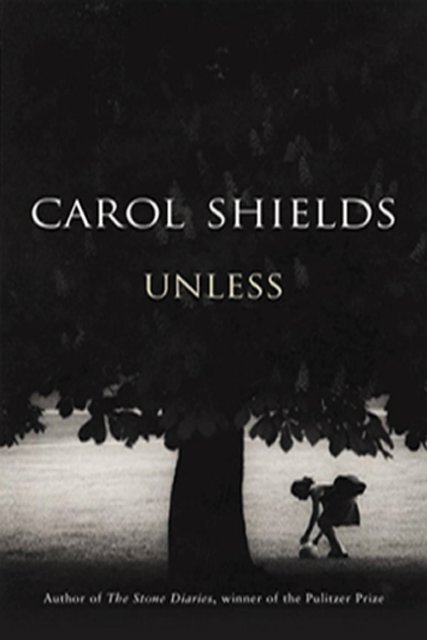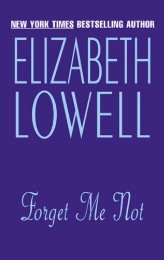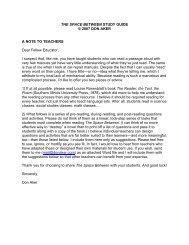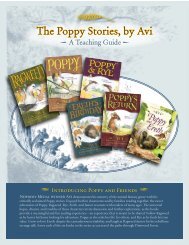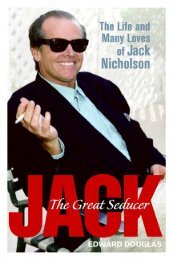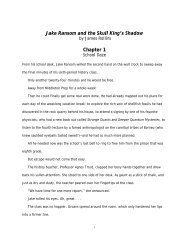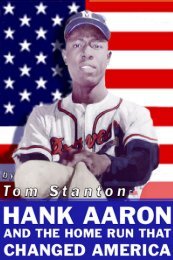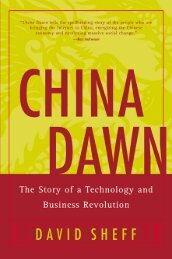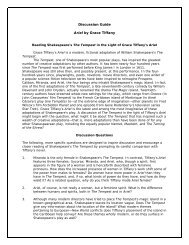Here's - HarperCollins Publishers
Here's - HarperCollins Publishers
Here's - HarperCollins Publishers
You also want an ePaper? Increase the reach of your titles
YUMPU automatically turns print PDFs into web optimized ePapers that Google loves.
Unless<br />
Carol Shields<br />
AN E-BOOK EXCERPT FROM
To Ezra and Jay
If we had a keen vision and feeling of all ordinary human life,<br />
it would be like hearing the grass grow and the squirrel’s<br />
heart beat, and we should die of that roar which lies on the<br />
other side of silence.<br />
george eliot
EPIGRAPH<br />
Here’s<br />
Nearly<br />
Once<br />
Wherein<br />
Nevertheless<br />
So<br />
Otherwise<br />
Instead<br />
Thus<br />
Yet<br />
Insofar As<br />
Thereof<br />
Every<br />
Regarding<br />
Hence<br />
Contents
Next<br />
Notwithstanding<br />
Thereupon<br />
Despite<br />
Throughout<br />
Following<br />
Hardly<br />
Since<br />
Only<br />
Unless<br />
Toward<br />
Whatever<br />
Any<br />
Whether<br />
Ever<br />
Whence<br />
Forthwith<br />
As<br />
Beginning With<br />
Already<br />
Hitherto<br />
Not Yet<br />
ACKNOWLEDGEMENTS<br />
ABOUT THE AUTHOR<br />
THE WORK OF CAROL SHIELDS<br />
CREDITS<br />
ABOUT THE PUBLISHER<br />
COVER IMAGE<br />
COPYRIGHT
Here’s<br />
It happens that I am going through a period of great unhappiness<br />
and loss just now. All my life I’ve heard people speak<br />
of finding themselves in acute pain, bankrupt in spirit and<br />
body, but I’ve never understood what they meant. To lose. To<br />
have lost. I believed these visitations of darkness lasted only a few<br />
minutes or hours and that these saddened people, in between<br />
bouts, were occupied, as we all were, with the useful monotony<br />
of happiness. But happiness is not what I thought. Happiness is<br />
the lucky pane of glass you carry in your head. It takes all your<br />
cunning just to hang on to it, and once it’s smashed you have to<br />
move into a different sort of life.<br />
In my new life—the summer of the year 2000—I am attempting<br />
to “count my blessings.” Everyone I know advises me to take up<br />
this repellent strategy, as though they really believe a dramatic loss<br />
can be replaced by the renewed appreciation of all one has been<br />
given. I have a husband, Tom, who loves me and is faithful to me<br />
and is very decent looking as well, tallish, thin, and losing his hair<br />
nicely. We live in a house with a paid-up mortgage, and our house<br />
is set in the prosperous rolling hills of Ontario, only an hour’s drive<br />
north of Toronto. Two of our three daughters, Natalie, fifteen,<br />
and Christine, sixteen, live at home. They are intelligent and lively<br />
and attractive and loving, though they too have shared in the loss,<br />
as has Tom.<br />
And I have my writing.<br />
“You have your writing!” friends say. A murmuring chorus: But<br />
you have your writing, Reta. No one is crude enough to suggest that<br />
1
carol shields<br />
my sorrow will eventually become material for my writing, but<br />
probably they think it.<br />
And it’s true. There is a curious and faintly distasteful comfort,<br />
at the age of forty-three, forty-four in September, in contemplating<br />
what I have managed to write and publish during those<br />
impossibly childish and sunlit days before I understood the meaning<br />
of grief. “My Writing”: this is a very small poultice to hold up<br />
against my damaged self, but better, I have been persuaded, than<br />
no comfort at all.<br />
It’s June, the first year of the new century, and here’s what<br />
I’ve written so far in my life. I’m not including my old schoolgirl<br />
sonnets from the seventies—Satin-slippered April, you glide<br />
through time / And lubricate spring days, de dum, de dum—and<br />
my dozen or so fawning book reviews from the early eighties. I<br />
am posting this list not on the screen but on my consciousness, a<br />
far safer computer tool and easier to access:<br />
1. A translation and introduction to Danielle Westerman’s book<br />
of poetry, Isolation, April 1981, one month before our daughter<br />
Norah was born, a home birth naturally; a midwife; you could<br />
almost hear the guitars plinking in the background, except we<br />
did not feast on the placenta as some of our friends were doing<br />
at the time. My French came from my Québécoise mother, and<br />
my acquaintance with Danielle from the University of Toronto,<br />
where she taught French civilization in my student days. She was<br />
a poor teacher, hesitant and in awe, I think, of the tanned, healthy<br />
students sitting in her classroom, taking notes worshipfully and<br />
stretching their small suburban notion of what the word civilization<br />
might mean. She was already a recognized writer of kinetic,<br />
tough-corded prose, both beguiling and dangerous. Her manner<br />
was to take the reader by surprise. In the middle of a flattened<br />
rambling paragraph, deceived by warm stretches of reflection,<br />
you came upon hard cartilage.<br />
I am a little uneasy about claiming Isolation as my own writing,<br />
but Dr. Westerman, doing one of her hurrying, over-the-head<br />
gestures, insisted that translation, especially of poetry, is a creative<br />
2
unless<br />
act. Writing and translating are convivial, she said, not oppositional,<br />
and not at all hierarchical. Of course, she would say that.<br />
My introduction to Isolation was certainly creative, though, since<br />
I had no idea what I was talking about.<br />
I hauled it out recently and, while I read it, experienced the<br />
Burrowing of the Palpable Worm of Shame, as my friend Lynn<br />
Kelly calls it. Pretension is what I see now. The part about art<br />
transmuting the despair of life to the “merely frangible,” and<br />
poetry’s attempt to “repair the gap between ought and naught”<br />
—what on earth did I mean? Too much Derrida might be the<br />
problem. I was into all that pretty heavily in the early eighties.<br />
2. After that came “The Brightness of a Star,” a short story that<br />
appeared in An Anthology of Young Ontario Voices (Pink Onion Press,<br />
1985). It’s hard to believe that I qualified as “a young voice” in<br />
1985, but, in fact, I was only twenty-nine, mother of Norah, aged<br />
four, her sister Christine, aged two, and about to give birth to<br />
Natalie—in a hospital this time. Three daughters, and not even<br />
thirty. “How did you find the time?” people used to chorus, and in<br />
that query I often registered a hint of blame: was I neglecting my<br />
darling sprogs for my writing career? Well, no. I never thought in<br />
terms of career. I dabbled in writing. It was my macramé, my knitting.<br />
Not long after, however, I did start to get serious and joined<br />
a local “writers’ workshop” for women, which met every second<br />
week, for two hours, where we drank coffee and had a good time<br />
and deeply appreciated each other’s company, and that led to:<br />
3. “Icon,” a short story, rather Jamesian, 1986. Gwen Reidman,<br />
the only published author in the workshop group, was our leader.<br />
The Glenmar Collective (an acronym of our first names—not very<br />
original) was what we called ourselves. One day Gwen said, moving<br />
a muffin to her mouth, that she was touched by the “austerity”<br />
of my short story—which was based, but only roughly, on my<br />
response to the Russian icon show at the Art Gallery of Ontario.<br />
My fictional piece was a case of art “embracing/repudiating art,”<br />
as Gwen put it, and then she reminded us of the famous “On First<br />
Looking Into Chapman’s Homer” and the whole aesthetic of art<br />
3
carol shields<br />
begetting art, art worshipping art, which I no longer believe in, by<br />
the way. Either you do or you don’t. The seven of us, Gwen,<br />
Lorna, Emma Allen, Nan, Marcella, Annette, and I (my name is<br />
Reta Winters—pronounced Ree-tah) self-published our pieces in a<br />
volume titled Incursions and Interruptions, throwing in fifty dollars<br />
each for the printing bill. The five hundred copies sold quickly in<br />
the local bookstores, mostly to our friends and families. Publishing<br />
was cheap, we discovered. What a surprise. We called ourselves<br />
the Stepping Stone Press, and in that name we expressed our mild<br />
embarrassment at the idea of self-publishing, but also the hope<br />
that we would “step” along to authentic publishing in the very<br />
near future. Except Gwen, of course, who was already there. And<br />
Emma, who was beginning to publish op-ed pieces in the Globe<br />
and Mail.<br />
4. Alive (Random House, 1987), a translation of Pour Vivre, volume<br />
one of Danielle Westerman’s memoirs. I may appear to be<br />
claiming translation as an act of originality, but, as I have already<br />
said, it was Danielle, in her benign way, wrinkling her disorderly<br />
forehead, who had urged me to believe that the act of shuffling<br />
elegant French into readable and stable English is an aesthetic<br />
performance. The book was well received by the critics and even<br />
sold moderately well, a dense but popular book, offered without<br />
shame and nary a footnote. The translation itself was slammed in<br />
the Toronto Star (“clumsy”) by one Stanley Harold Howard, but<br />
Danielle Westerman said never mind, the man was un maquereau,<br />
which translates, crudely, as something between a pimp and a<br />
prick.<br />
5. I then wrote a commissioned pamphlet for a series put out<br />
by a press calling itself Encyclopédie de l’art. The press produced<br />
tiny, hold-in-the-hand booklets, each devoted to a single art<br />
subject, covering everything from Braque to Calder to Klee to<br />
Mondrian to Villon. The editor in New York, operating out of a<br />
phone booth it seemed to me, and knowing nothing of my ignorance,<br />
had stumbled on my short story “Icon” and believed me to<br />
be an expert on the subject. He asked for three thousand words<br />
4
unless<br />
for a volume (volumette, really) to be called Russian Icons, published<br />
finally in 1989. It took me a whole year to do, what with<br />
Tom and the three girls, and the house and garden and meals and<br />
laundry and too much inwardness. They published my “text,”<br />
such a cold, jellied word, along with a series of coloured plates, in<br />
both English and French (I did the French as well) and paid me<br />
four hundred dollars. I learned all about the schools of Suzdal and<br />
Vladimir and what went on in Novgorod (a lot) and how images<br />
of saints made medieval people quake with fear. To my knowledge,<br />
the book was never reviewed, but I can read it today without<br />
shame. It is almost impossible to be pseudo when writing<br />
about innocent paintings that obey no rules of perspective and<br />
that are done on slabs of ordinary wood.<br />
6. I lost a year after this, which I don’t understand, since all<br />
three girls had started school, though Natalie was only in morning<br />
kindergarten. I think I was too busy thinking about the business of<br />
being a writer, about being writerly and fretting over whether<br />
Tom’s ego was threatened and being in Danielle’s shadow, never<br />
mind Derrida, and needing my own writing space and turning<br />
thirty-five and feeling older than I’ve ever felt since. My age—<br />
thirty-five—shouted at me all the time, standing tall and wide in<br />
my head, and blocking access to what my life afforded. Thirty-five<br />
never sat down with its hands folded. Thirty-five had no composure.<br />
It was always humming mean, terse tunes on a piece of<br />
folded cellophane. (“I am composed,” said John Quincy Adams on<br />
his deathbed. How admirable and enviable and beyond belief; I<br />
loved him for this.)<br />
This anguish of mine was unnecessary; Tom’s ego was unchallenged<br />
by my slender publications. He turned out to be one of<br />
those men we were worried about in the seventies and eighties,<br />
who might shrivel in acknowledgment of his own insignificance.<br />
Ordinary was what he wanted, to be an ordinary man embedded<br />
in a family he loved. We put a skylight in the box room, bought<br />
a used office desk, installed a fax and a computer, and I sat down<br />
on my straight-from-a-catalogue Freedom Chair and translated<br />
5
carol shields<br />
Danielle Westerman’s immense Les femmes et le pouvoir, the English<br />
version published in 1992, volume two of her memoirs. In<br />
English the title was changed to Women Waiting, which only<br />
makes sense if you’ve read the book. (Women possess power, but<br />
it is power that has yet to be seized, ignited, and released, and so<br />
forth.) This time no one grumped about my translation. “Sparkling<br />
and full of ease,” the Globe said, and the New York Times went<br />
one better and called it “an achievement.”<br />
“You are my true sister,” said Danielle Westerman at the time<br />
of publication. Ma vraie soeur. I hugged her back. Her craving for<br />
physical touch has not slackened even in her eighties, though<br />
nowadays it is mostly her doctor who touches her, or me with my<br />
weekly embrace, or the manicurist. Dr. Danielle Westerman is<br />
the only person I know who has her nails done twice a week,<br />
Tuesday and Saturday (just a touch-up), beautiful long nail beds,<br />
matching her long quizzing eyes.<br />
7. I was giddy. All at once translation offers were arriving in the<br />
mail, but I kept thinking I could maybe write short stories, even<br />
though our Glenmar group was dwindling, what with Emma<br />
taking a job in Newfoundland, Annette getting her divorce, and<br />
Gwen moving to the States. The trouble was, I hated my short<br />
stories. I wanted to write about the overheard and the glimpsed,<br />
but this kind of evanescence sent me into whimsy mode, and<br />
although I believed whimsicality to be a strand of the human<br />
personality, I was embarrassed at what I was pumping into my<br />
new Apple computer, sitting there under the clean brightness of<br />
the skylight. Pernicious, precious, my moments of recognition.<br />
Ahah!—and then she realized; I was so fetching with my “Ellen was<br />
setting the table and she knew tonight would be different.” A<br />
little bug sat in my ear and buzzed: Who cares about Ellen and<br />
her woven placemats and her hopes for the future?<br />
I certainly didn’t care.<br />
Because I had three kids, everyone said I should be writing<br />
kiddy lit, but I couldn’t find the voice. Kiddy lit screeched in my<br />
brain. Talking ducks and chuckling frogs. I wanted something<br />
6
unless<br />
sterner and more contained as a task, which is how I came to write<br />
Shakespeare and Flowers (San Francisco: Cyclone Press, 1994). The<br />
contract was negotiated before I wrote one word. Along came a<br />
little bundle of cash to start me off, with the rest promised on publication.<br />
I thought it was going to be a scholarly endeavour, but I<br />
ended up producing a wee “giftie” book. You could send this book<br />
to anyone on your list who was maidenly or semi-academic or<br />
whom you didn’t know very well. Shakespeare and Flowers was<br />
sold in the kind of outlets that stock greeting cards and stuffed<br />
bears. I simply scanned the canon and picked up references to, say,<br />
the eglantine (A Midsummer Night’s Dream) or the blackberry<br />
(Troilus and Cressida) and then I puffed out a little description of the<br />
flower, and conferenced on the phone (twice) with the illustrator<br />
in Berkeley, and threw in lots of Shakespearean quotes. A sweet<br />
little book, excellent slick paper, US$12.95. At sixty-eight pages<br />
it fits in a small mailer. Two hundred thousand copies, and still<br />
selling, though the royalty rate is scandalous. They’d like me to<br />
do something on Shakespeare and animals, and I just might.<br />
8. Eros: Essays, by Danielle Westerman, translation by Reta<br />
Winters, hastily translated—everything was hasty in those days,<br />
everything still is—and published in 1995. Hugely successful, after<br />
a tiny advance. We put the dog in a kennel, and Tom and I and<br />
the girls took the first translation payment and went to France for<br />
a month, southern Burgundy, a village called La Roche-Vineuse,<br />
where Danielle had grown up, halfway between Cluny and<br />
Mâcon, red-tiled roofs set in the midst of rolling vineyards, incandescent<br />
air. Our rental house was built around a cobbled courtyard<br />
full of ancient roses and hydrangeas. “How old is this<br />
house?” we asked the neighbours, who invited us in for an aperitif.<br />
“Very old” was all we got. The stone walls were two feet<br />
thick. The three girls took tennis lessons at l’école d’été. Tom went<br />
hacking for trilobites, happy under the French sun, and I sat in a<br />
wicker chair in the flower-filled courtyard, shorts and halter and<br />
bare feet, a floppy straw hat on my head, reading novels day after<br />
day, and thinking: I want to write a novel. About something<br />
7
carol shields<br />
happening. About characters moving against a “there.” That was<br />
what I really wanted to do.<br />
Looking back, I can scarcely believe in such innocence. I didn’t<br />
think about our girls growing older and leaving home and falling<br />
away from us. Norah had been a good, docile baby and then she<br />
became a good, obedient little girl. Now, at nineteen, she’s so<br />
brimming with goodness that she sits on a Toronto street corner,<br />
which has its own textual archaeology, though Norah probably<br />
doesn’t know about that. She sits beneath the lamppost where the<br />
poet Ed Lewinski hanged himself in 1955 and where Margherita<br />
Tolles burst out of the subway exit into the sunshine of her<br />
adopted country and decided to write a great play. Norah sits<br />
cross-legged with a begging bowl in her lap and asks nothing of<br />
the world. Nine-tenths of what she gathers she distributes at the<br />
end of the day to other street people. She wears a cardboard sign<br />
on her chest: a single word printed in black marker—goodness.<br />
I don’t know what that word really means, though words are<br />
my business. The Old English word wearth, I discovered the other<br />
day on the Internet, means outcast; the other English word, its<br />
twin, its cancellation, is worth—we know what that means and<br />
know to distrust it. It is the word wearth that Norah has swallowed.<br />
This is the place she’s claimed, a whole world constructed<br />
on stillness. An easy stance, says the condemning, grieving<br />
mother, easy to find and maintain, given enough practice. A<br />
sharper focus could be achieved by tossing in an astringent fluid, a<br />
peppery sauce, irony, rebellion, tattoos and pierced tongue and<br />
spiked purple hair, but no. Norah embodies invisibility and goodness,<br />
or at least she is on the path—so she said in our last conversation,<br />
which was eight weeks ago, the eleventh of April. She<br />
wore torn jeans that day and a rough plaid shawl that was almost<br />
certainly a car blanket. Her long pale hair was matted. She<br />
refused to look us in the eye, but she did blink in acknowledgement—I’m<br />
sure of it—when I handed her a sack of cheese<br />
sandwiches and Tom dropped a roll of twenty-dollar bills in her<br />
lap. Then she spoke, in her own voice, but emptied of connection.<br />
8
unless<br />
She could not come home. She was on the path to goodness. At<br />
that moment I, her mother, was more absent from myself than<br />
she; I felt that. She was steadfast. She could not be diverted. She<br />
could not “be” with us.<br />
How did this part of the narrative happen? We know it didn’t<br />
rise out of the ordinary plot lines of a life story. An intelligent and<br />
beautiful girl from a loving family grows up in Orangetown,<br />
Ontario, her mother’s a writer, her father’s a doctor, and then she<br />
goes off the track. There’s nothing natural about her efflorescence<br />
of goodness. It’s abrupt and brutal. It’s killing us. What will really<br />
kill us, though, is the day we don’t find her sitting on her chosen<br />
square of pavement.<br />
But I didn’t know any of this when I sat in that Burgundy<br />
garden dreaming about writing a novel. I thought I understood<br />
something of a novel’s architecture, the lovely slope of predicament,<br />
the tendrils of surface detail, the calculated curving upward<br />
into inevitability, yet allowing spells of incorrigibility, and then<br />
the ending, a corruption of cause and effect and the gathering<br />
together of all the characters into a framed operatic circle of<br />
consolation and ecstasy, backlit with fibre-optic gold, just for a<br />
moment on the second-to-last page, just for an atomic particle of<br />
time.<br />
I had an idea for my novel, a seed, and nothing more. Two<br />
appealing characters had suggested themselves, a woman and a<br />
man, Alicia and Roman, who live in Wychwood, which is a city<br />
the size of Toronto, who clamour and romp and cling to the<br />
island that is their life’s predicament—they long for love, but<br />
selfishly strive for self-preservation. Roman is proud to be choleric<br />
in temperament. Alicia thinks of herself as being reflective, but<br />
her job as assistant editor on a fashion magazine keeps her too<br />
occupied to reflect.<br />
9. And I had a title, My Thyme Is Up. It was a pun, of course,<br />
from an old family joke, and I meant to write a jokey novel. A<br />
light novel. A novel for summertime, a book to read while seated<br />
in an Ikea wicker chair with the sun falling on the pages as faintly<br />
9
carol shields<br />
and evenly as human breath. Naturally the novel would have a<br />
happy ending. I never doubted but that I could write this novel,<br />
and I did, in 1997—in a swoop, alone, during three dark winter<br />
months when the girls were away all day at school.<br />
10. The Middle Years, the translation of volume three of Westerman’s<br />
memoirs, is coming out this fall. Volume three explores<br />
Westerman’s numerous love affairs with both men and women,<br />
and none of this will be shocking or even surprising to her readers.<br />
What is new is the suppleness and strength of her sentences.<br />
Always an artist of concision and selflessness, she has arrived in<br />
her old age at a gorgeous fluidity and expansion of phrase. My<br />
translation doesn’t begin to express what she has accomplished.<br />
The book is stark; it’s also sentimental; one balances and rescues<br />
the other, strangely enough. I can only imagine that those endless<br />
calcium pills Danielle chokes down every morning and<br />
the vitamin E and the emu oil capsules have fed directly into her<br />
vein of language so that what lands on the page is larger, more<br />
rapturous, more self-forgetful than anything she’s written before,<br />
and all of it sprouting short, swift digressions that pretend to<br />
be just careless asides, little swoons of surrender to her own<br />
experience, inviting us, her readers, to believe in the totality of<br />
her abandonment.<br />
Either that or she’s gone senile to good effect, a grand loosening<br />
of language in her old age. The thought has more than once<br />
occurred to me.<br />
Another thought has drifted by, silken as a breeze against a<br />
lattice. There’s something missing in these memoirs, or so I think<br />
in my solipsistic view. Danielle Westerman suffers, she feels<br />
the pangs of existential loneliness, the absence of sexual love, the<br />
treason of her own woman’s body. She has no partner, no one for<br />
whom she is the first person in the world order, no one to depend<br />
on as I do on Tom. She does not have a child, or any surviving<br />
blood connection for that matter, and perhaps it’s this that makes<br />
the memoirs themselves childlike. They go down like good milk,<br />
foaming, swirling in the glass.<br />
10
unless<br />
11. I shouldn’t mention Book Number Eleven since it is not a<br />
fait accompli, but I will. I’m going to write a second novel, a<br />
sequel to My Thyme Is Up. Today is the day I intend to begin. The<br />
first sentence is already tapped into my computer: “Alicia was not<br />
as happy as she deserved to be.”<br />
I have no idea what will happen in this book. It is a mere<br />
abstraction at the moment, something that’s popped out of the<br />
ground like the rounded snout of a crocus on a cold lawn. I’ve<br />
stumbled up against this idea in my clumsy manner, and now<br />
the urge to write it won’t go away. This will be a book about lost<br />
children, about goodness, and going home and being happy and<br />
trying to keep the poison of the printed page in perspective. I’m<br />
desperate to know how the story will turn out.<br />
11
Nearly<br />
We are more than halfway through the year 2000.<br />
Toward the beginning of August, Tom’s old friend<br />
Colin Glass came to dinner one night, driving out<br />
from Toronto. Over coffee he attempted to explain the theory of<br />
relativity to me.<br />
I was the one who invited him to launch into the subject.<br />
Relativity is a piece of knowledge I’ve always longed to understand,<br />
a big piece, but the explainers tend to go too fast or else<br />
they skip over a step they assume their audience has already<br />
absorbed. Apparently, there was once a time when only one<br />
person in the world understood relativity (Einstein), then two<br />
people, then three or four, and now most of the high-school kids<br />
who take physics have at least an inkling, or so I’m told. How<br />
hard can it be? And it’s passed, according to Colin, from crazy<br />
speculation to confirmed fact, which makes it even more important<br />
to understand. I’ve tried, but my grasp feels tenuous. So, the<br />
speed of light is constant. Is that all?<br />
Ordinarily, I love these long August evenings, the splash of<br />
amber light that falls on the white dining-room walls just before<br />
the separate shades of twilight take over. The medallion leaves<br />
that flutter their round ghost shadows. All day I’d listened to<br />
the white-throated sparrows in the woods behind our house;<br />
their song resembles the Canadian national anthem, at least the<br />
opening bars. Summer was dying, but in pieces. We’d be eating<br />
outside if it weren’t for the wasps. Good food, the company of a<br />
good friend, what more could anyone desire? But I kept thinking<br />
12
unless<br />
of Norah sitting on her square of pavement and holding up the<br />
piece of cardboard with the word goodness, and then I lost track<br />
of what Colin was saying.<br />
E=mc 2 . Energy equals mass times the speed of light, squared.<br />
The tidiness of the equation raised my immediate suspicion. How<br />
can mass—this solid oak dining table, for instance—have any connection<br />
with how fast light travels? They’re two different things.<br />
Colin, who is a physicist, was patient with my objections. He<br />
took the linen napkin from his lap and stretched it taut across the<br />
top of his coffee cup. Then he took a cherry from the fruit bowl<br />
and placed it on the napkin, creating a small dimple. He tipped the<br />
cup slightly so that the cherry rotated around the surface of<br />
the napkin. He spoke of energy and mass, but already I had lost<br />
a critical filament of the argument. I worried slightly about his<br />
coffee sloshing up onto the napkin and staining it, and thought<br />
how seldom in the last few years I had bothered with cloth<br />
napkins. Nobody, except maybe Danielle Westerman, does real<br />
napkins anymore; it was understood that modern professional<br />
women had better things to do with their time than launder linen.<br />
By now I had forgotten completely what the cherry (more than<br />
four dollars a pound) represented and what the little dimple was<br />
supposed to be. Colin talked on and on, and Tom, who is a family<br />
physician and has a broad scientific background, seemed to be<br />
following; at least he was nodding his head appropriately. My<br />
mother-in-law, Lois, had politely excused herself and returned to<br />
her house next door; she would never miss the ten-o’clock news;<br />
her watching of the ten-o’clock news helps the country of Canada<br />
to go forward. Christine and Natalie had long since drifted from<br />
the table, and I could hear the buzz and burst of TV noises in<br />
the den.<br />
Pet, our golden retriever, parked his shaggy self under the<br />
table, his whole dog body humming away against my foot.<br />
Sometimes, in his dreams, he groans and sometimes he chortles<br />
with happiness. I found myself thinking about Marietta, Colin’s<br />
wife, who had packed her bags a few months ago and moved to<br />
13
carol shields<br />
Calgary to be with another man. She claimed Colin was too<br />
wrapped up in his research and teaching to be a true partner. A<br />
beautiful woman with a neck like a plant stem, she hinted that<br />
there had been a collapse of passion in their marriage. She had<br />
left suddenly, coldly; he had been shocked; he had had no idea, he<br />
told us in the early days, that she had been unhappy all these<br />
years, but he found her diaries in a desk drawer and read them,<br />
sick with realization that a gulf of misunderstanding separated<br />
them.<br />
Why would a woman leave such personal diaries behind?<br />
To punish, to hurt, of course. Colin, for the most part a decent,<br />
kind-hearted man, used to address her in a dry, admonitory way,<br />
as though she were a graduate student instead of his wife. “Don’t<br />
tell me this is processed cheese,” he asked her once when we<br />
were having dinner at their house. Another time: “This coffee is<br />
undrinkable.” He loved pleasure—he was that kind of man—and<br />
took it for granted and couldn’t help his little yelps of outrage<br />
when pleasure failed. You could call him an innocent in his expectations,<br />
almost naive on this particular August evening. It was as<br />
though he were alone in a vaulted chamber echoing with immensities,<br />
while Tom and I stood attendance just outside the door,<br />
catching the overflow, the odd glimpse of his skewed but calm<br />
brilliance. Even the little pockets under his eyes were phlegmatic.<br />
He was not a shallow person, but perhaps he suspected that we<br />
were. I had to stop myself interrupting with a joke. I often do this,<br />
I’m afraid: ask for an explanation and then drift off into my own<br />
thoughts.<br />
How could he now be sitting at our table so calmly, toying<br />
with cherries and coffee cups and rolling the edge of his straw<br />
placemat, and pressing this heft of information on us? It was close<br />
to midnight; he had an hour’s drive ahead of him. What did the<br />
theory of relativity really matter to his ongoing life? Colin, with<br />
his small specs and trim moustache, was at ease with big ideas like<br />
relativity. As a theory, relativity worked, it held all sorts of important<br />
“concepts” together with its precision and elegance. Think of<br />
14
unless<br />
glue lavishly applied, he said helpfully about relativity; think of<br />
the power of the shrewd guess. Such a sweeping perspective had<br />
been visionary at the beginning, but had been assessed and reinforced,<br />
and it was, moreover, Colin was now insisting, useful.<br />
In the face of life’s uncertainties, relativity’s weight could be<br />
assumed and then set aside, part of the package of consciousness.<br />
He finished awkwardly, sat back in his chair with his two long<br />
arms extended. “So!” That’s it, he seemed to say, or that’s as<br />
much as I can do to simplify and explain so brilliant an idea. He<br />
glanced at his watch, then sat back again, exhausted, pleased with<br />
himself. He wore a well-pressed cotton shirt with blue and yellow<br />
stripes, neatly tucked into his black jeans. He has no interest<br />
in clothes. This shirt must go back to his married days, chosen<br />
for him, ironed for him by Marietta herself and put on a hanger,<br />
perhaps a summer ago.<br />
The theory of relativity would not bring Colin’s wife hurrying<br />
back to the old stone house on Oriole Parkway. It would not<br />
bring my daughter Norah home from the corner of Bathurst and<br />
Bloor, or the Promise Hostel where she beds at night. Tom and<br />
I followed her one day; we had to know how she managed,<br />
whether she was safe. The weather would be turning cold soon.<br />
How does she bear it? Cold concrete. Dirt. Uncombed hair.<br />
“Would you say,” I asked Colin—I had not spoken for several<br />
minutes—“that the theory of relativity has reduced the weight of<br />
goodness and depravity in the world?”<br />
He stared at me. “Relativity has no moral position. None whatever.”<br />
(“This coffee is undrinkable.”)<br />
I looked to Tom for support, but he was gazing with his mild<br />
eyes at the ceiling, smiling. I knew that smile.<br />
“But isn’t it possible,” I said to Colin, “to think that goodness,<br />
or virtue if you like, could be a wave or particle of energy?”<br />
“No,” he said. “No, it is not possible.”<br />
I made an abrupt move to clear the table. I was suddenly<br />
exhausted.<br />
Still, I am thankful for the friendship and intellectual ardour of<br />
15
carol shields<br />
such an unpretentious man as Colin Glass, who despite his suffering<br />
and shame really wanted me to understand a key concept of<br />
the twentieth century. Or was he simply diverting himself for an<br />
hour? This is what I must learn: the art of diversion. He said not<br />
one word about Marietta all evening long. Tom and I understand<br />
that he is reconstructing his life without her. But a daughter is<br />
something different. A daughter of nineteen cannot be erased.<br />
16
Once<br />
It was understood that I would do the publicity, such as it<br />
was, for Danielle Westerman’s third volume of memoirs. At<br />
eighty-five she was too old, and too distinguished, to handle<br />
a day of interviews in Toronto, even though she lives there. I, as<br />
the translator, could easily field questions from the press. A very<br />
light schedule was organized by the publisher, since Dr. Westerman<br />
already possesses a long twilight of faithful readership.<br />
In early September, I drove into Orangetown, down its calm,<br />
old-fashioned main street and into the countryside again. The city<br />
of Toronto, monumental and lonely, glowed in front of me. Its<br />
outskirts are ragged, though its numbered exits pretend at a kind<br />
of order. Traffic was light. I drove slowly by the corner of Bloor<br />
and Bathurst for a glimpse of Norah. There she was, as always, on<br />
the northeast corner, seated on the ground near the subway<br />
entrance with her bowl and cardboard sign, even though it was<br />
not yet nine o’clock. Had she had breakfast? Did she have nits in<br />
her hair? What is she thinking, or is her mind a great blank?<br />
I parked the car and walked over to where she was. “Hello,<br />
darling Norah,” I said, setting down a plastic bag of food: bread<br />
and cheese, fruit and raw vegetables. And, in an envelope, a<br />
recent photo of Pet with his straight, proud muzzle and furry<br />
ruff. Norah, of all the girls, doted on Pet, and now I was bribing<br />
her shamelessly. It was a chilly day, and it iced my heart to see her<br />
unreadable immobility, but I was glad to notice that she was<br />
wearing warm mittens. Glad? Me glad? The least little signal will<br />
gladden my heart these days. Today she looked not quite at me,<br />
17
carol shields<br />
and nodded. Another wave of gladness struck. I allow myself only<br />
one such glimpse a week, since she’s made it clear she doesn’t<br />
want to see us.<br />
It is like watching her through plate glass. All week I will draw<br />
expensively on this brief moment of voyeurism, at the same time<br />
trying to blot it out with images of Norah on her bicycle; Norah<br />
sitting at the kitchen table studying for exams; Norah reaching for<br />
her green raincoat; Norah trying on new school shoes; Norah<br />
sleeping, safe.<br />
After a while I went to have my eyebrows arched and tinted at<br />
Sylvia’s, which calls itself a “spirit spa,” meaning, it seemed, that<br />
while Madame Sylvia swiped at my brow with a little paintbrush,<br />
she murmured and sang into my ear. It was now nine-thirty in the<br />
morning and I lay on a narrow table in a tiny white room. “You<br />
are at the age when you must protect the fine skin around the<br />
eyes,” she warned. “A woman’s face falls, it is inevitable, but<br />
the eyes go on and on, giving light. You will be eighty, ninety,<br />
and your eyes will still charm.”<br />
She knows nothing about my life. I’ve never been here before<br />
and have never thought of having an eyebrow tint. I have perfectly<br />
decent eyebrows, nicely shaped and regular, but I did look<br />
into a mirror a week or so ago and noticed that the small hairs at<br />
the outside corners were coming in grey. There was a little grey<br />
at the temples too, but nothing to be surprised about, not for<br />
a woman whose forty-fourth birthday is approaching, not for a<br />
woman who has never even thought of herself as possessing<br />
“temples,” such august body parts.<br />
“Are you by any chance a Gemini?” Madame Sylvia asked<br />
intimately. Swish went the paintbrush. She stopped, peered at me<br />
closely, then swished again, a deft little stroke.<br />
“No,” I said, ashamed to acknowledge the astrological universe.<br />
“My birthday’s in September. Next week, in fact.”<br />
“I can tell, yes.” She had a touch of the harridan in her voice. “I<br />
can always tell.”<br />
What could she tell?<br />
18
unless<br />
“Twenty-four dollars,” she said. “Let me give you my card. For<br />
next time.”<br />
Presumptuous, but yes, there will be a next time. I calculated<br />
quickly. My face would make it through the next few weeks, but<br />
by November I will probably be back in Madame Sylvia’s hushed<br />
white cell. I may well become a regular. Eyebrows, lashes, full<br />
facials, neck massage. I have led a reflective life, a life of thought,<br />
a writer, a translator, but all this is about to change. The delicate<br />
skin around my eyes was demanding attention. Has Tom noticed?<br />
I don’t think so. Christine and Natalie don’t really look at me in<br />
that way; they just see this watercolour blob that means mother,<br />
which is rather how I see myself.<br />
“A woman’s charm is with her for life,” Madame Sylvia said,<br />
“but you must pay attention.”<br />
No, I thought an hour later, no. I’m sorry, but I have no plans<br />
to be charming on a regular basis. Anyone can be charming. It’s<br />
really a cheap trick, mere charm, so astonishingly easy to perform,<br />
screwing up your face into sunbeams, and spewing them<br />
forth. The calculated lift of the wrist, chin up, thumb and forefinger<br />
brought together to form a little feminine loop, that trick<br />
of pretending to sit on a little glass chair, that concentration of<br />
radiance, l’esprit; little sprinkles of it everywhere, misting the air<br />
like bargain scent. Ingenue spritz, Emma Allen calls it.<br />
I know that cheapness so intimately—the grainy, sugary, persevering<br />
way charm enters a fresh mouth and rubs against the<br />
molars, sticking there in soft wads, promoting mouth ulcers<br />
or whatever it is that’s the metaphoric projection of self-hatred.<br />
Of all the social virtues, charm is, in the end, the most unrewarding.<br />
And compared to goodness, real goodness, or the unmovable<br />
self-abnegation my daughter Norah practises, charm is nothing<br />
but crumpled tissue paper, soiled from previous use.<br />
Sincerity? No. Sincerity’s over. Sincerity’s lost whatever edge it<br />
had. It’s fine, fine matter but wasted on the press, who all grew up<br />
post-Holocaust, devoted readers of Mad Magazine, and wouldn’t<br />
recognize a bar of willed innocence if it came wrapped in foil.<br />
19
carol shields<br />
Nor will I ever again be pointlessly, endlessly polite. I got over<br />
that two years ago when I did my author tour. It seems I’ve lost,<br />
like a stream of pebbles leaving my hand, the kind of endurance<br />
that professional courtesy demands: suck in your breath, let your<br />
face go numb, listen to the interviewer’s questions, register<br />
optimally, let your breath out, evaluate the feelings of those who<br />
depend on you (agent, publisher, editor, that nice Sheila person<br />
who does publicity, and of course Danielle Westerman), and<br />
perform again and again like the tuned-up athlete you are, the fit<br />
physical specimen that each new book demands, then move on to<br />
the next task.<br />
Mrs. Winters, who has just translated The Middle Years, the unfolding<br />
memoir of Holocaust survivor Danielle Westerman, is a woman<br />
of grace and charm, whose thick brown hair is arranged into a bun.<br />
Putting down her coffee cup, she shrugs off her beige raincoat and . . .<br />
I’ve entered early middle age now and I have a nineteen-yearold<br />
daughter who lives on the street. I no longer require a reputation<br />
for charm, those saving lilac shadows and contours. Maybe I<br />
never did. I won’t—not now—tuck the ends of my sentences into<br />
little licks of favour, and the next time a journalist pins me down<br />
with a personal question, trolling for information—Tell me, Mrs.<br />
Winters, how are you able to balance your family and professional<br />
life?—I will stare back hard with my newly practised stare.<br />
How do I balance my life? Tinted eyebrows up. Just what kind of<br />
inquiry is this? Wouldn’t you prefer, Mrs. Winters, to pursue you<br />
own writing rather than translate Dr. Westerman’s work? Please,<br />
not that again. How did you and your husband meet? What does<br />
he think of your writing?<br />
I will in the future address my interviewer directly, and say<br />
with firmness: “This interview is over.” There is nothing to lose.<br />
Rude and difficult people are more likely to be taken seriously.<br />
Curmudgeons are positively adored. I’ve noticed this. Even the<br />
fascinatingly unknowable earn respect.<br />
And when I read in the paper tomorrow that “Mrs. Winters<br />
looked all of her forty-three years” and that “Mrs. Winters with<br />
20
unless<br />
her familiar overbite was reluctant to talk about her work schedule,”<br />
I will want to phone the editor and complain bitterly. This<br />
from the pen of a small, unattractive man, almost entirely lipless<br />
beneath a bony, domineering nose, sweating with minor<br />
ambition, head tilted like something carved out of yellow wax.<br />
He interviewed me in a cappuccino bar in mid-Toronto. A<br />
chilly, stooped, round-headed man in his thirties or forties—it<br />
was hard to tell—slow to smile, pathetically in need of human<br />
attention, thinking his superior thoughts. Fluff on his shoulders<br />
begged to be picked off. I, on the other hand, was wearing a soft<br />
jade jacket of cashmere lined with silk, which represented a rare<br />
splurge on my part, but I could be sure this man would overlook<br />
this garment with its crystal buttons and mandarin collar and<br />
concentrate instead on my drab raincoat, beige, and not quite<br />
pristine at the cuffs. In print he will be certain to refer to my<br />
chignon as a bun. It’s taken me years to learn to do a glossy little<br />
chignon—I can get my hair brushed back and securely pinned<br />
up each morning in a mere two and a half minutes and I consider<br />
my coiffure one of my major life accomplishments. I really mean<br />
this.<br />
Sheila from publicity had filled me in before the interview, and<br />
I felt the information packet hovering; what to do with it? This<br />
young/youngish man was the newly appointed books columnist<br />
at Booktimes. He was well known for holding pious opinions about<br />
the literature of the Great North, about his own role as advocate<br />
of a diverse new outpouring of Canadian voices, the post-colonial<br />
cry of blaming anguish. The stream of current fiction about<br />
middle-class people living in cities was diluting the authentic<br />
national voice that rose from the landscape itself and—<br />
Oh, shut up, shut up.<br />
Cappuccino foam dotted the corners of his undistinguished<br />
mouth. And just one more question, Mrs. Winters—<br />
Of course he didn’t call me Reta, even though there might be<br />
only a year or two between us. The “Mrs.” gave him power over<br />
me: that vexing r rucking things up in the middle and making one<br />
21
carol shields<br />
think of such distractions as clotheslines and baking tins. He was<br />
the barking terrier, going at Mrs. Winters’s ankles, shaking out his<br />
fur and asking me to justify myself, wanting me to explain the<br />
spluttering, dying, whimpering bonfire of my life, which I would<br />
not dream of sharing. He seemed to forget he was interviewing<br />
me about Danielle Westerman’s new book.<br />
I understand you’re working on a second novel, said he.<br />
Well, yes.<br />
Takes nerve.<br />
Uh-huh.<br />
Actually—actually, well, he had a novel on the go himself.<br />
Really! What a surprise!<br />
At the end of the hour he did not ask for the bill. I asked for the<br />
bill. “I’ll just put it on my Visa,” I said, breaking a tenuous breadth<br />
of silence. I announced this with all the majesty I could muster<br />
over a vinyl table, like a grande dame, adding twenty years to my<br />
age, and feeling the vowels shifting in my beautifully moulded<br />
throat. Such dignity; I surprised myself with my own resonance,<br />
and I may have managed a pained smile, displaying, no doubt,<br />
that famous overbite. He turned off the tape recorder at the word<br />
“Visa.”<br />
He had two young children at home, he said. Christ, what a<br />
responsibility, although he loved the little bastards. One of them<br />
was quite, quite gifted; well, they both were in their separate<br />
ways. But the work of raising kids! Never enough time to read the<br />
books he had to review, books all over the house with little markers<br />
in them, books he would never finish. So much was expected,<br />
and of course, like all journalists, he was underpaid.<br />
Oh, shut up.<br />
They also expected him to do a feature on the weekend.<br />
Uh-huh?<br />
And last week he’d actually broken the MacBunna story.<br />
Really? Macumba? Marimba?<br />
Congratulations, said Mrs. Reta Winters from Orangetown.<br />
Thanks.<br />
22
unless<br />
I should be getting on my way, I said. My parking meter. A<br />
lunch date. A long drive home.<br />
I understand you and your family live in a lovely old house<br />
near Orangetown . . .<br />
And then, slyly: I understand one of your daughters now lives<br />
in Toronto and . . .<br />
I’ve been here before. There is something about having an<br />
established family, a long-lasting spousal arrangement, three<br />
daughters in their teens, a house in the country, a suggestion of<br />
impermeability, that draws the curiosity of others so that they<br />
can, as Tom says, probe with probity.<br />
But no, this man across the table will not be feeding on my<br />
flesh, nor will his colleagues—though one can tell that he has no<br />
colleagues; there is no possibility of colleagues. He has no context<br />
for friends or co-workers, though there are the kids and there’s<br />
the wife; he’s referred to her three times now. Nicola. She has her<br />
professional life, too, he tells me, as though the matter were in<br />
dispute.<br />
I can’t resist. “Does Nicola—is she a journalist too?”<br />
“Journalist?”<br />
“Like you, I mean.”<br />
His hand jumps, and for a moment I think he’s going to turn<br />
the tape recorder on again. But no, he’s reaching into his pocket<br />
and now he’s releasing two coins onto the table. The tip. They lie<br />
there, moist from his hand. Two dimes. I focus on them with<br />
what I hope is a cool, censorious gaze.<br />
But he’s not looking at me. He’s looking across the room<br />
where a silver-haired man is seating himself gracefully at a table.<br />
“I’m not sure, but I think that’s Gore Vidal,” my interviewer whispers<br />
in a hungry voice. “He’s here for the writers’ festival, you<br />
know.”<br />
I rise and exit, as though led by a brass quintet.<br />
The charming Mrs. Winters slips on her comfortable beige raincoat<br />
. . .<br />
23
I would like to thank a number of others who in one way<br />
or another encouraged me in the writing of Unless: Sharon<br />
Allan, Marjorie Anderson, the late Joan Austen-Leigh, Joan<br />
Barfoot, Clare Boylan, Marg Edmond Brown, Joan Clark,<br />
Anne Collins, Cynthia Coop, Patrick Crowe, Maggie Dwyer,<br />
Darlene Hammell, Blanche Howard, Isabel Huggan, Carl<br />
Lenthe, Madeline Li, Elinor Lipman, Anna and Sylvie Matas,<br />
Margaret Shaw-Mackinnon, Don McCarthy, Peter Parker,<br />
Bella Pomer, Christopher Potter, Linda Rogers, Carole<br />
Sabiston, Floyd St. Clair, Eleanor Wachtel, Cindi Warner,<br />
Mindy Werner, the John Simon Guggenheim Foundation,<br />
and, as always, my family: John, Audrey, Anne, Catherine,<br />
Meg, Sara, and, especially, Don.
About the Author<br />
Carol Shields is the author of eight novels and two collections of short stories.<br />
The Stone Diaries won the Pulitzer Prize and was shortlisted for the Booker<br />
Prize. Larry’s Party won the Orange Prize. Born and brought up in Chicago,<br />
Carol Shields has lived in Canada since 1957.
the work of carol shields<br />
poetry<br />
Others<br />
Intersect<br />
Coming to Canada<br />
novels<br />
Larry’s Party<br />
The Stone Diaries<br />
The Republic of Love<br />
A Celibate Season (with Blanche Howard)<br />
Swann<br />
A Fairly Conventional Woman<br />
Happenstance<br />
The Box Garden<br />
Small Ceremonies<br />
story collections<br />
Various Miracles<br />
The Orange Fish<br />
Dressing Up for the Carnival<br />
plays<br />
Departures and Arrivals<br />
Thirteen Hands<br />
Fashion, Power, Guilt and the Charity of Families<br />
(with Catherine Shields)<br />
Anniversary (with David Williamson)<br />
criticism<br />
Susanna Moodie: Voice and Vision<br />
Jane Austen<br />
anthology<br />
Dropped Threads: What We Aren’t Told<br />
(Edited with Marjorie Anderson)
Credits<br />
Design by Julian Humphries<br />
Photographer by Michael Crouser<br />
Designed by Dinah Drazin
If you enjoyed reading this excerpt, please visit<br />
<strong>HarperCollins</strong> <strong>Publishers</strong> to find out where to buy this<br />
and other PerfectBound e-books.<br />
Australia<br />
http://www.harpercollins.com.au<br />
Canada<br />
http://www.harpercanada.com<br />
New Zealand<br />
http://www.harpercollins.co.nz<br />
United Kingdom<br />
http://www.fireandwater.com<br />
United States<br />
http://www.perfectbound.com
The Pajama Game Words and Music by Richard Adler Music<br />
and Jerry Ross © Richard Adler Music and J & J Ross Co, USA<br />
Warner/Chappell Music Ltd, London w6 8bs<br />
Reproduced by permission of International Music Publications<br />
Ltd. All Rights Reserved.<br />
This is a work of fiction. Names, characters, places and incidents<br />
either are the products of the author’s imagination or are used<br />
fictitiously. Any resemblance to actual events, locales, organizations,<br />
or persons, living or dead, is entirely coincidental and<br />
beyond the intent of either the author or the publisher.<br />
UNLESS. Copyright © 2002 by Carol Shields. All rights<br />
reserved under International and Pan-American Copyright<br />
Conventions. By payment of the required fees, you have been<br />
granted the non-exclusive, non-transferable right to access and<br />
read the text of this e-book on-screen. No part of this text may<br />
be reproduced, transmitted, down-loaded, decompiled, reverse<br />
engineered, or stored in or introduced into any information storage<br />
and retrieval system, in any form or by any means, whether<br />
electronic or mechanical, now known or hereinafter invented,<br />
without the express written permission of PerfectBound.<br />
PerfectBound and the PerfectBound logo are trademarks<br />
of <strong>HarperCollins</strong> <strong>Publishers</strong>, Inc.<br />
Adobe Acrobat E-Book Reader edition v 1. May 2002<br />
ISBN 0-06-052370-0<br />
Print edition first published in 2002<br />
by Forth Estate, a division of <strong>HarperCollins</strong> <strong>Publishers</strong>, Inc.<br />
10 9 8 7 6 5 4 3 2 1


